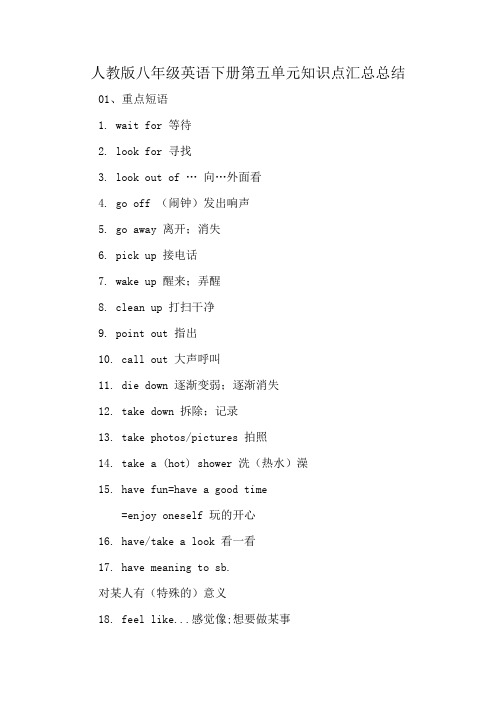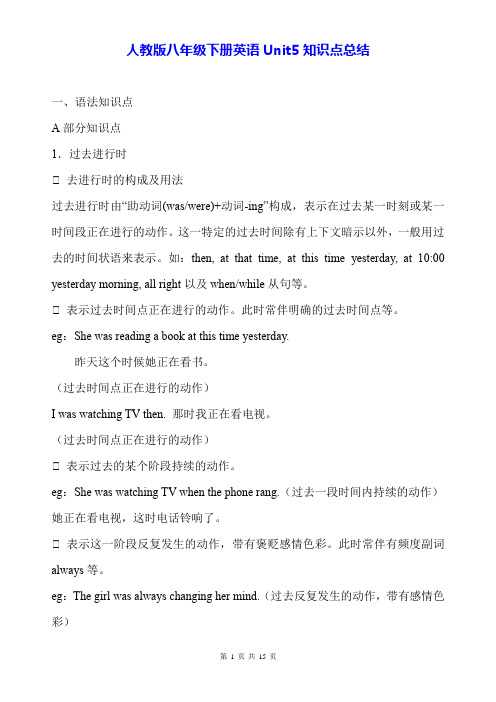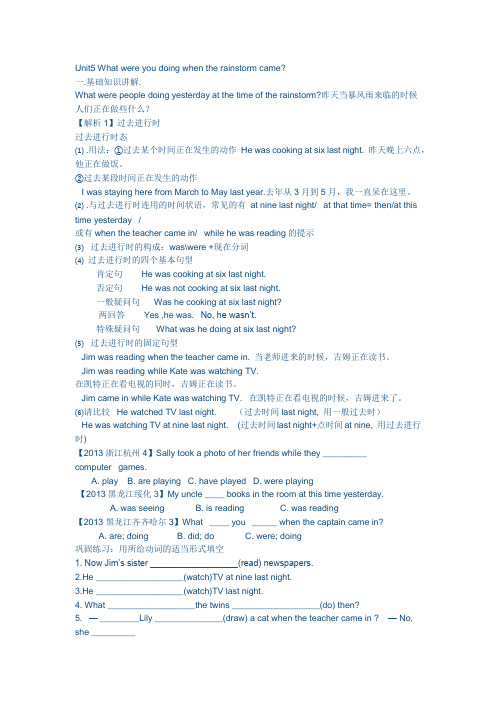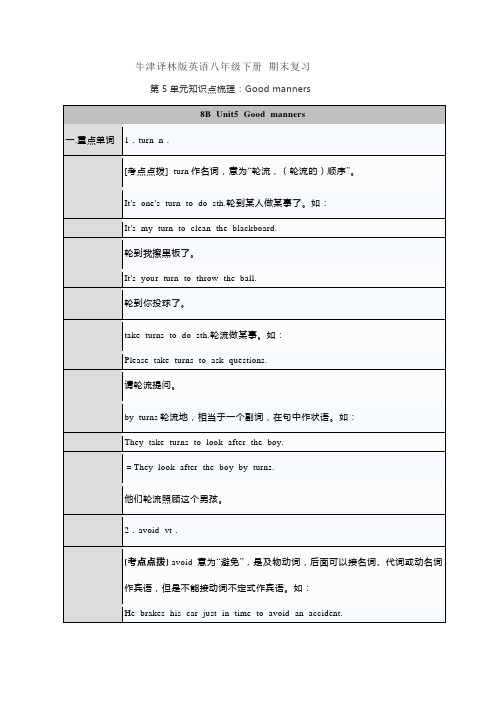八年级下册英语第五单元知识点整理
- 格式:doc
- 大小:31.50 KB
- 文档页数:4

英语八年级下册第五单元笔记一、重点单词。
1. beginning.- 名词,“开始;开端”。
例如:At the beginning of the movie, there was a big explosion.(在电影开始的时候,有一场大爆炸。
)- 其动词形式是begin,begin to do sth.或者begin doing sth.表示“开始做某事”,如:He begins to study/studying English at 7 every day.(他每天7点开始学习英语。
)2. heavily.- 副词,“在很大程度上;大量地;猛烈地”。
常用来修饰动词或形容词。
例如:It rained heavily last night.(昨晚雨下得很大。
)3. strange.- 形容词,“奇特的;奇怪的;陌生的”。
如:There is a strange noise in the room.(房间里有一个奇怪的声音。
)- 其名词形式是stranger,“陌生人”。
例如:Don't talk to strangers.(不要和陌生人说话。
)4. wind.- 名词,“风”,是不可数名词。
如:The wind is blowing strongly.(风刮得很猛。
)- 其动词形式为“wind”,读音为[waɪnd],表示“蜿蜒;曲折前行;缠绕”,例如:The river winds through the mountains.(这条河蜿蜒穿过山脉。
)5. report.- 名词,“报告;报道”。
例如:I read a report about the accident in the newspaper.(我在报纸上读到了一篇关于这个事故的报道。
)- 动词,“报道;公布”。
如:The journalist reported the news on TV.(这位记者在电视上报道了这条新闻。

Unit 5 What were you doing when the rainstorm came?1.短语归纳2.典句必背3.用法集萃(1)What was the girl doing at the time of the rainstorm?暴风雨来的时候,那个女孩正在做什么?❖本句是特殊疑问句,时态是过去进行时,结构是“What+was/were+主语+doing+其他?”,用于询问某人在过去的某个时间正在做的事情。
例:—What were you doing at nine o’clock yesterday evening? 昨天晚上九点你正在做什么?—I was watching TV at home. 我正在家里看电视。
❖拓展:过去进行时描述过去某个时刻正在发生的动作或存在的状态,结构是“was/ were+动词的现在分词”。
例:When I got home my mother was cooking. 我到家的时候我妈妈正在做饭(2)My alarm didn’t go off... 我的闹钟没有响.....❖go off意为“(闹钟)发出响声”例:My alarm goes off at six every morning. 我的闹钟每天早晨6点响。
❖归纳:go off还有“离开”和“变质”之意。
例:Bob went off to get a drink. 鲍勃拿饮料去了。
Meat goes off quickly in hot weather. 热天肉变质得快。
❖拓展:go的短语(3)I called at seven and you didn’t pick up. 我七点打的电话,你没有接。
❖pick up意为“接电话”。
pick up有如下含义:(4)I called again at eight and you didn’t answer then either. 我八点再打来,你也没接。

八年级下册英语第五单元知识点
摘要:
1.条件状语从句
2.half与half of的用法
3.重要短语和句型
正文:
八年级下册英语第五单元主要涉及了以下几个知识点:
1.条件状语从句:if引导的条件状语从句表示“如果”。
构成形式为主句一般将来时时态,if从句一般现在时态,或if从句一般现在时态,主句一般将来时态。
用法:表示假设或条件。
2.half与half of的用法:half为形容词,表示“一半的,半个的”。
half of代词/the名词,表示“一半”。
3.重要短语和句型:
- arrive at/in:到达(小地方用arrive at,大地方用arrive in)
- reach:到达
- get to:到达
- on foot:步行
- at the school gate:在学校大门口
- on weekdays:在平日,工作日
- on weekends:在周末
以下是一个关于这些知识点的实用例子:
假设你是一名学生,有一天你告诉你的朋友:“如果明天不下雨,我们就去公园玩耍。
”这句话中就用到了条件状语从句。
另外,如果你说:“我有一半的作业已经完成了。
”这就是使用了half这个形容词。
而在描述到达某个地方的方式时,你可以用arrive at(如:我昨天到达北京),或reach(如:我昨天到达北京),也可以说get to(如:我昨天到达北京)。
学习这些知识点有助于提高你的英语水平,更好地应对日常学习和生活中的各种场景。

人教版八年级英语下册第五单元知识点汇总总结01、重点短语1. wait for 等待2. look for 寻找3. look out of … 向…外面看4. go off (闹钟)发出响声5. go away 离开;消失6. pick up 接电话7. wake up 醒来;弄醒8. clean up 打扫干净9. point out 指出10. call out 大声呼叫11. die down 逐渐变弱;逐渐消失12. take down 拆除;记录13. take photos/pictures 拍照14. take a (hot) shower 洗(热水)澡15. have fun=have a good time=enjoy oneself 玩的开心16. have/take a look 看一看17. have meaning to sb.对某人有(特殊的)意义18. feel like...感觉像;想要做某事19. make sure 务必,确保20. beat against 敲打21. fall asleep 进入梦乡22. break … apart 使…支离破碎23. turn on打开 (反:turn off关上)24. listen to the radio 听收音机25. get to = arrive in/at 到达26. make one’s way to 前往;费力前行27. to tell the truth 说实话28. walk by 路过29. at the time of …在…的时候30. in a mess 凌乱不堪;乱七八糟31. in times of difficulty 在困难时期32. because of 因为33. in history 在历史上34. in silence 沉默,无声35. at first 起初;起先36. by the side of …在…旁边37. the rest of …剩余的38. each other 互相39. for example 例如40. as well 也02、重点句子Grammar Focus 句子1. What were you doing at eight last night?昨天晚上8点你在做什么?I was taking a shower.我在洗淋浴。

人教版八年级英语下册第五单元知识点总结一、Key sentences1. What were you doing at the time of the rainstorm (=when the rainstorm came) ?2. While John was taking photos ,Mary bought a drink.= John was taking photos when Mary bought a drink.3. Jenny was helping her mom doing housework while Bob was sleeping.4. I called you but you didn’t pick up.Oh, I was sleeping.5. You’re kidding! 你开玩笑吧!二、key phrases.1. in the library \ on (in) the street \ at the bus stop\ in the kitchen \ outside his home \in the area \ in the neighborhood \ in history2. be busy with +名词be busy doing 忙于……3. go off (闹钟)发出响声4. rain (v.) heavily \ hard 下大雨a heavy \ hard rain (n.) 一场大雨5. miss the bus 错过车catch the bus 赶上车6. pick up 拾起,捡起pick up the phone = answer the phone 接电话pick sb up 开车接某人7. bring sth together 把某物聚在一起bring sb together 把某些人聚到一起;使某些人团结起来8. make sure 尽力做到; 确保; 务必be sure 相信;确信9. make \ cook dinner 做晚饭10. beat against 拍打11. at first 起先(下文要转折,first 强调顺序)12. fall \go asleep =go \get to sleep 入睡13. die down 减弱;平息14. at around \ about 3 o’clock 在大约三点15. break...apart 分裂;解体16. by the side of the road 在路边17. walk by 走路经过18. be \ get killed 被谋杀;被害19. the rest =the other \others 剩下;剩余20. in silence 沉默21. take down 1) 摧毁;拆除2)取下;记下22. have meaning to 对……有意义23. look out 小心;当心look out of 向…… 外看24. by sb 被某人;由某人25. tell the truth 说实话tell a lie 说谎26. as well 也27. couldn’t \wouldn’t believe 难以相信28. make one's way to.... 在某人去……的路上29. in a mess 一团糟;乱七八糟30. the Animal Helpline 动物保护热线the World Trade Center 世贸中心31 point out 指出point at 指向(近)point to 指向(远)32. remember doing sth. 记得做过某事remember to do sth. 记得去做某事33. join sb to do (join sb for +n) 和某人一起做某事33. Recycling :wait for \ wake up \ look for \ take a shower \ help with \pieces of \ feel like \ play a card game \ for example \ have a look\ have trouble (in) doing sth. =have problems/difficulty (in) doing sth做某事有困难或麻烦三、key points1. 辨析:when while(1)表示“当……的时候”,如后面连接的动词为进行时态,则用while多于用when。

八年级英语下册第五单元的知识点1.If引导的条件状语从句:1)构成:if引导的条件状语从句表示“如果…”。
构成形式为“主句+一般将来时时态+if从句+一般现在时态”,或“If从句+一般现在时态,主句+一般将来时态”。
2)用法:表示假设或条件2.half 与half of的用法:1)half the class中的“half”为形容词,意思“一半的,半个的”2) “half of+代词/the+名词”中的half为名词,意思为“一半,半个”。
当该构造在句子作主语时,谓语动词必须和该词组中的代词或名词保持数的一致。
即当代词或名词为单数时,谓语动词用第三人称单数形式;假设所接名词或代词为复数,那么谓语动词用复数形式。
3. all the time与always: all the time是个副词性的短语,意思为“一直”“始终”,表示某一特定阶段开始一直到完毕,不表示频度,多置于句末。
除此,all the time还有“不断”的意思;always为表示频度的副词,意思为“总是”,表示动作的反复,状态的继续,中间没有连续,其反义词为never。
它与进展时态连用时,常翻译成“总是”,“老是”,带有赞美,厌烦,不满等感情色彩。
4.Enough的用法:1)enough to do sth表示“足够…可以做…”2)enough也可以用“for+宾语+to do sth的构造”3)enough 修饰名词时前面不用冠词4)当主语是代词时,enough可以作表语。
当主语是名词时,enough不能做表语。
5.Choose的用法:1)choose+名词意思为“选择…”;2)choose+between/from从…中选择;3)choose to do选择做某事6.Exercise的用法:1)运动,锻炼,是不可数名词2)体操,练习,是可数名词。
3)动词,使….运动7.wear, put on, have on, dress: wear“穿着”“戴着”,表示状态,是延续性动词,一般现在时表示经常状态,现在进展时表示暂时状态;put on“穿上”“戴上”,表示动作,是非延续性动词;have on“穿着”“戴着”,表示状态可以与wear互换;dress“穿上”“穿着”,既表示状态,也表示动作,既可以作及物动词,也可以作不及物动词。

八年级下册英语第五单元的知识点包括但不限于以下几个方面:
1. 重点词汇:包括动词如“去散步”、“去跑步”、“去游泳”,名词如“日记”,形容词如“忙碌的”、“有精神的”、“健康的”等。
2. 重点短语:如“make a reservation for dinner”,意为“为晚餐预定位置”。
3. 句子结构:本单元涉及到的句子结构包括现在进行时、一般现在时、一般过去时等。
例如,“We are leaving for the airport at 3:00pm.”,意为“我们下午3点出发去机场。
”,“I am meeting my friend tomorrow.”,意为“明天我要和朋友见面。
”,“I have a busy day today.”,意为“我今天很忙。
”
4. 语法知识:第五单元还介绍了副词修饰动词的用法,如“I usually go to school on foot.”,意为“我通常走路去学校。
”,“He can swim very fast.”,意为“他游泳游得很快。
”。
5. 日常用语:本单元涉及到的日常用语包括“How are you?”,“What's new?”,“Can you help me with...?”,“Is there anything new in...?”,“Could you please...?”。
6. 写作技能:学习写日记和会议记录也是本单元的重点之一。
在写作过程中,需要注意日记的格式和会议记录的要点。
以上是八年级下册英语第五单元的主要知识点,希望对您有所帮助。

八年级英语下册第五单元知识点整理一。
重要词汇和句子1。
助动词do 用于条件状语从句或答语中起省略作用, 可使句子更简练. (1)———I think I’m going to take the bus to the party 。
———If you do ,you’ll be late .(2) --- Do you like reading harry potter ?—-—No , I don't 。
But my sister does 。
2. have a good \ great \ wonderful time == have fun == enjoy oneself玩得很高兴\ 过得很愉快I had a good \ great \ wonderful time in the park yesterday 。
==I had fun in the park yesterday .== I enjoyed myself in the park yesterday .3. let sb. \ sth. in 让某人\ 某物进来Why not let him in ?You’d better open the windows and let some fresh air in .4. organize 动词, “组织, 安排, 筹备"They are going to organize a picnic 。
organization 名词, “组织, 机构"She works for a voluntary organization helping homeless people . organizer 名词, “组织者, 建立者”The organizers of the concert said they had a great success 。
5。
take away 拿走,取走take (an active ) part in (积极) 参加take off 起飞,脱下take …to …把….。

Unit 5 What were you doing when the rainstorm came?一、词汇与短语◆重点单词A部分1.rainstorm 暴风雨n.2.window 窗;窗户n.3.alarm 闹钟n.4.flashlight 手电筒;火炬n. 5.suddenly 突然;忽然adv.6.match 火柴n.7.strange 奇特的;奇怪的adj.8.against 倚;碰;撞prep. 9.storm 暴风雨n.10.asleep 睡着adj.11.begin 开始v.12.rise 升起;增加;提高v.&n. 13.heavily 在很大程度上;大量地adv.14.fallen 倒下的;落下的adj. 15.wind 风n.16.apart 分离;分开adv. 17.light 光;光线;光亮n.18.icy 覆盖着冰的;冰冷的adj. 19.report 报道;公布v.&n.20.kid 开玩笑;欺骗v.21.area 地域;地区n.22.beat 敲打;打败v.23.wood 木;木头n.B部分1.realize 理解;领会;认识到v.2.recently 不久前;最近adv. 3.passage 章节;段落n.4.terrorist 恐怖主义者;恐怖分子n. 5.pupil 小学生n.6.date 日期;日子n. 7.completely 彻底地;完全地adv.8.tower 塔;塔楼n.9.shocked 惊愕的;受震惊的adj.10.truth 实情;事实n. 11.silence 沉默;缄默;无声n.◆重点短语A部分1.pick up ( = pick up the phone) 接电话2.have a look 看一看3.die down逐渐变弱;逐渐消失4.at the bus stop 在公交车站5.go off (闹钟)发出响声6.wait for 等待7.go to work 去上班8.rain heavily 下大雨9.see sb. doing sth. 看见某人正在做某事10.begin to do sth. 开始做某事11.take a shower 洗淋浴12.at that time 在那时13.so many times 这么多次14.feel like 感觉像15.need help with sth. 需要……(方面)帮助16.make sure 确保17.with no light outside 外面没有灯光18.help sb. (to) do sth. 帮助某人做某事19.put……over……把……覆盖在……上20.make dinner 做晚饭21.put sth. on the table 把某物放在桌子上22.play a card game 玩纸牌游戏23.beat heavily against the windows 猛烈地敲打着窗户24.get to the place of the accident 到达事故发生地25.have fun 玩得愉快26.wake up 醒来;叫醒27.at first 起初;起先28.in times of difficulty 在困难时29.fall asleep 进入梦乡;睡着30.right away 立刻;马上31.go outside with sb. 和某人一起出去32.in the library 在图书馆33.find sth. in a mess 发现……一片狼藉34.on the street 在大街上35.break sth. apart 把某物折断(或分开)B部分1.in silence 沉默;无声2.in history 在历史上3.take down 拆除;往下拽;记录4.remember doing sth. 记得做过某事5.make one's way 前往;费力地前进6.look out of the window 向窗外看7.the school basketball competition 学校篮球比赛8.have meaning to sb.对某人来说有意义9.walk by 从旁边经过10.point sth. out to sb. 向某人指岀某物11.by the side of the road 在路边12.go away 离开13.at the event 在这次活动中14.as well 也15.be late for 迟到16.call out the winner 宣布获胜者17.on this day 在这一天18.10 minutes ago 十分钟前19.on April 4 在四月四日20.be completely shocked 完全震惊了21.an important event 一次重要的事件22.the rest of 其余的23.on the radio 在收音机上◆重点句子A部分1.What were people doing yesterday at the time of the rainstorm?昨天暴风雨来临时人们正在干什么?2.when the rain storm suddenly came, what were you doing?当暴风雨突然来临时,你正在做什么?3.So while you were sleeping, I called Jenny and she helped me.因此在你睡觉的时候,我打电话给珍妮,她帮了我。

新版八年级英语下册第五单元知识点归纳新版八年级英语下册第五单元知识点归纳Unit hat ere u ding hen the rainstr ae?一基础知识讲解hat ere peple ding esterda at the tie f the rainstr?昨天当暴风雨临的时候人们正在做些什么?【解析1】过去进行时过去进行时态⑴用法:①过去某个时间正在发生的动作He as ing at six last night 昨天晚上六点,他正在做饭。
②过去某段时间正在发生的动作I as staing here fr arh t a last ear去年从3月到月,我一直呆在这里。
⑵与过去进行时连用的时间状语,常见的有at nine last night/ at that tie= then/at this tie esterda /或有hen the teaher ae in/ hile he as reading的提示⑶过去进行时的构成:as\ere +现在分词⑷过去进行时的四个基本句型肯定句He as ing at six last night否定句He as nt ing at six last night一般疑问句as he ing at six last night?两回答es ,he as N, he asn’t特殊疑问句hat as he ding at six last night?⑸过去进行时的固定句型i as reading hen the teaher ae in 当老师进的时候,吉姆正在读书。
i as reading hile ate as athing TV在凯特正在看电视的同时,吉姆正在读书。
i ae in hile ate as athing TV 在凯特正在看电视的时候,吉姆进了。
⑹请比较He athed TV last night (过去时间last night, 用一般过去时)He as athing TV at nine last night (过去时间last night+点时间at nine, 用过去进行时)【2013浙江杭州4】Sall t a pht f her friends hile the _________ puter gaesA plaB are plaing have plaed D ere plaing【2013黑龙江绥化3】unle ____ bs in the r at this tie esterdaA as seeingB is reading as reading【2013黑龙江齐齐哈尔3】hat ____ u _____ hen the aptain ae in?A are; dingB did; d ere; ding巩固练习:用所给动词的适当形式填空1 N i’s sister __________________(read) nespapers2He __________________(ath)TV at nine last night3He __________________(ath)TV last night4 hat __________________the tins __________________(d) then?— ________Lil ______________(dra) a at hen the teaher ae in ? — N, she _________6 __________________u __________________(have) supper at that tie?7 a __________________(nt read) a b at nine esterda evening8 N i __________________(pla) basetball n the plagrund(操场)9 hat ___________________ he _______________ (d) at nine ’l last night10 The ___________________ (listen) t the usi at that tie11 hen the teaher ae in, the students ___________________ (read) the text12 e ___________________ (ath) TV hen suddenl the telephne rang13 Her ther ____________() hile her father as athing TV【解析2】at the tie f 在的时候(常用于过去进行时)【解析3】rainstr n 暴风雨rainat 雨衣raindrp雨滴2 alar didn’t g ff s I ___ up late 我的闹钟没有响,因此我____晚了。

人教版八年级下册英语Unit5知识点总结一、语法知识点A部分知识点1.过去进行时❶ 去进行时的构成及用法过去进行时由“助动词(was/were)+动词-ing”构成,表示在过去某一时刻或某一时间段正在进行的动作。
这一特定的过去时间除有上下文暗示以外,一般用过去的时间状语来表示。
如:then, at that time, at this time yesterday, at 10:00 yesterday morning, all right以及when/while从句等。
❶ 表示过去时间点正在进行的动作。
此时常伴明确的过去时间点等。
eg:She was reading a book at this time yesterday.昨天这个时候她正在看书。
(过去时间点正在进行的动作)I was watching TV then. 那时我正在看电视。
(过去时间点正在进行的动作)❶ 表示过去的某个阶段持续的动作。
eg:She was watching TV when the phone rang.(过去一段时间内持续的动作)她正在看电视,这时电话铃响了。
❶ 表示这一阶段反复发生的动作,带有褒贬感情色彩。
此时常伴有频度副词always等。
eg:The girl was always changing her mind.(过去反复发生的动作,带有感情色彩)这个女孩老是改变主意。
❶ 表示过去动作延迟到以后发生,即用过去进行表过去将来,此类动词是一些位置的变化的词。
eg:He told me that he was going soon.(过去进行表将来)他告诉我他很快就要走了。
❶ 过去进行时的一般疑问句句型:Be(Was/Were)+主语+现在分词+其他?肯定回答:Yes,主语+be(was/were).否定回答:No,主语+be(was/were) not.eg:--Were you cooking at that time? 那时,你在做饭吗?--Yes, I were.是的。

八年级英语下册Unit5单元知识点八年级英语下册Unit5单元知识点在复习八年级英语Unit5单元遇到困难时不要气馁,做好八年级英语Unit5单元知识点的归纳是非常重要的。
以下是店铺给你推荐的八年级英语下册Unit5单元知识点归纳,希望对你有帮助!八年级英语下册Unit5单元知识点篇11. make sure 确信;确认2. beat against... 拍打… …3. fall asleep 进人梦乡;睡着4. die down 逐渐变弱;逐渐消失5. wake up 醒来6. in a mess 一团糟7. break.. . apart 使……分离8. in times of difficulty 在困难的时候9. at the time of 当.......时候10. go off (闹钟)发出响声11. take a hot shower 洗热水澡12. miss the bus 错过公交车13. pick up 接电话14. bring... together 使……靠拢15. in the area 在这个地区16. miss the event 错过这个事件17. by the side of the road 在路边18. the Animal Helpline 动物保护热线19. walk by 走路经过20. make one’s way to. . 在某人去……的路上八年级英语下册Unit5单元知识点篇21. hear the news 听到这个消息2., important events in history 历史上的重大事件3., for example 例如4., be killed 被杀害5., over 50 5 0多(岁)6. a school pupil 一个小学生7. on the radio 通过广播8., in silence 沉默;无声9., more recently 最近地;新近10., the World Trade Center 世贸中心11., take down 拆除;摧毁12., have meaning to 对……有意义13., remember doing sth. 记得做过某事14., at first 首先;最初八年级英语下册Unit5单元知识点篇31. — What were you doing at eight last night?昨晚8 点你在干什么?— I was taking a shower.我在洗淋浴。

人教版八年级下册英语Unit 5单元语法知识点总结本单元重点短语的具体用法1. make sure:确信;确认。
例如:Make sure you lock the door before you leave.(在你离开之前,确保锁好门。
)2. beat against...:拍打……。
例如:The waves were beating against the shore.(波浪拍打着海岸。
)3. fall asleep:进入梦乡;睡着。
例如:I fell asleep while watching TV.(我看电视时睡着了。
)4. die down:逐渐变弱;逐渐消失。
例如:The fire died down after the firefighters arrived.(消防员到达后,火逐渐熄灭了。
)5. wake up:醒来。
例如:I usually wake up at 7 o'clock in the morning.(我通常早上7 点醒来。
)6. in a mess:一团糟。
例如:The room is in a mess.(房间一团糟。
)7. break...apart:使……分离。
例如:The police had to break the door apart to enter the room.(警察不得不破门而入进入房间。
)8. in times of difficulty:在困难的时候。
例如:We should help each other in times of difficulty.(在困难的时候,我们应该互相帮助。
)9. at the time of:当……时候。
例如:At the time of the accident, I was sleeping.(在事故发生时,我正在睡觉。
)10. go off:(闹钟)发出响声。
例如:The alarm went off at 6 o'clock.(闹钟在6 点钟响了。

Unit5 What were you doing when the rainstorm came?一.基础知识讲解.What were people doing yesterday at the time of the rainstorm?昨天当暴风雨来临的时候人们正在做些什么?【解析1】过去进行时过去进行时态⑴ .用法:①过去某个时间正在发生的动作He was cooking at six last night. 昨天晚上六点,他正在做饭。
②过去某段时间正在发生的动作I was staying here from March to May last year.去年从3月到5月,我一直呆在这里。
⑵ .与过去进行时连用的时间状语,常见的有at nine last night/ at that time= then/at this time yesterday /或有when the teacher came in/ while he was reading的提示⑶过去进行时的构成:was\were +现在分词⑷过去进行时的四个基本句型肯定句He was cooking at six last night.否定句He was not cooking at six last night.一般疑问句Was he cooking at six last night?两回答Yes ,he was. No, he wasn’t.特殊疑问句What was he doing at six last night?⑸过去进行时的固定句型Jim was reading when the teacher came in. 当老师进来的时候,吉姆正在读书。
Jim was reading while Kate was watching TV.在凯特正在看电视的同时,吉姆正在读书。
Jim came in while Kate was watching TV. 在凯特正在看电视的时候,吉姆进来了。

八年级英语下册Unit-5知识点总结Unit5-What-were-you-doing-w hen-the-rainstorm-cameUnit5 What were you doing when the rainstorm came?一.基础知识讲解.What were people doing yesterday at the time of the rainstorm?昨天当暴风雨来临的时候人们正在做些什么?【解析1】过去进行时过去进行时态⑴ .用法:①过去某个时间正在发生的动作He was cooking at six last night. 昨天晚上六点,他正在做饭。
②过去某段时间正在发生的动作I was staying here from March to May last year.去年从3月到5月,我一直呆在这里。
⑵ .与过去进行时连用的时间状语,常见的有at nine last night/ at that time= then/at this time yesterday /或有when the teacher came in/ while he was reading的提示⑶过去进行时的构成:was\were +现在分词⑷过去进行时的四个基本句型肯定句He was cooking at six lastnight.否定句He was not cooking at six last night.一般疑问句Was he cooking at six last night?两回答Yes ,he was. No, he wasn’t.特殊疑问句What was he doing at six last night?⑸过去进行时的固定句型Jim was reading when the teacher came in. 当老师进来的时候,吉姆正在读书。
Jim was reading while Kate was watching TV.在凯特正在看电视的同时,吉姆正在读书。

unit5八年级下知识点Unit 5 八年级下知识点八年级下学期的 Unit 5 是关于过去完成时态的学习。
这个学习单元涉及了一系列的语法知识点,包括用法、结构和标志词等,下面我们逐一进行探讨。
一、用法1. 表示过去某个时间以前已经完成的动作或状态,常与过去时态连用。
例如:- By the time I got to the cinema, the film had started.- When we arrived at the restaurant, they had already finished eating.2. 强调“过去完成”的动作或状态,尤其是在时间、条件等表达中。
例如:- If he had studied harder, he would have passed the exam. - After he had finished his homework, he went to bed.二、结构过去完成时态的结构为 had + 过去分词。
例如:- She had finished her work by the time we arrived.- They had already left when we got there.三、标志词过去完成时态有一些常见的标志词,如:before, after, by, until, already, just, never, ever, recently, etc.例如:- I had never seen such a beautiful sunset before.- They had just arrived when the storm hit.以上就是八年级下学期的 Unit 5 关于过去完成时态的知识点了。
希望同学们能够认真学习和理解这些语法知识,加强自己的英语语法能力,提高英语水平。

八年级下册英语第五单元知识点八年级下册英语第五单元知识点大全1. make sure 确信;确认2. beat against... 拍打……3. fall asleep 进人梦乡;睡着4. die down 逐渐变弱;逐渐消失5. wake up 醒来6. in a mess 一团糟7. break.. . apart 使……分离 8. in times of difficulty 在困难的时候9. at the time of 当.......时候 10. go off (闹钟)发出响声11. take a hot shower 洗热水澡 12. miss the bus 错过公交车13. pick up 接电话 14. bring... together 使……靠拢15. in the area 在这个地区 16. miss the event 错过这个事件17. by the side of the road 在路边 18. the Animal Helpline 动物保护热线19. walk by 走路经过 20. make one’s way to. 在某人去……的路上21. hear the news 听到这个消息22., important events in history 历史上的重大事件 23., for example 例如24., be killed 被杀害 25., over 50 5 0多(岁)26. a school pupil 一个小学生 27. on the radio 通过广播28., in silence 沉默;无声 29., more recently 最近地;新近30., the World Trade Center 世贸中心 31., take down 拆除;摧毁32., have meaning to 对……有意义 33., remember doing sth. 记得做过某事34., at first 首先;最初学好英语的四个环节是什么1、自觉预习。


八年级下册英语第五单元知识点笔记一、单元概述本单元主题是“旅游与文化”,主要围绕旅游相关的词汇和表达方式展开。
学习本单元,学生将能够使用英语描述旅游经历,介绍不同的文化和风俗,以及表达对不同旅游目的地的看法。
二、重点词汇1. 地点名词:旅游胜地(tourist attraction)、博物馆(museum)、文化中心(cultural center)、风景区(scenic area)等。
2. 形容词:美丽的(beautiful)、壮观的(magnificent)、独特的(unique)、令人惊叹的(amazing)等,用于描述旅游胜地和文化风俗。
3. 动词:参观(visit)、游览(explore)、了解(learn about)、体验(experience)等,用于表达旅游过程中的活动。
4. 短语:流连忘返(lose oneself in)、令人难以置信(unbelievable)等,用于描述旅游经历。
三、重点语法1. 时态:一般现在时和现在进行时,用于描述旅游经历和感受。
2. 句式:描述旅游胜地和文化风俗的句式,如“某某地方是一个非常美丽/壮观/独特的旅游胜地,那里有……”,或“我非常喜欢这个地方,因为……”。
3. 从句:有时可以在句中加入宾语从句或状语从句,进一步丰富句式和表达情感。
四、知识点笔记1. 词汇用法:要正确使用地点名词和形容词,描述旅游胜地和文化风俗的美丽、壮观和独特之处。
同时,注意动词的时态和语态,表达自己在旅游过程中的活动和感受。
2. 句式结构:掌握常见的旅游相关句式结构,如“我推荐这个地方/这个景点/这个活动……”;“我认为这个地方/这个景点/这个活动……”,以及“我认为这个地方/这个景点应该被更多人知道”等。
3. 从句运用:适当使用从句可以增加句子的复杂性和表达的丰富性。
在旅游英语中,常用的从句有宾语从句、状语从句和定语从句。
例如,“当我来到这个地方时,我被它的美丽/壮观/独特之处深深吸引”或“当我参观博物馆时,我了解到了很多关于……的知识”。
八年级下册英语第五单元知识点整理
一,课文重难点讲解:
1. If you go to the party, you'll have a good time.
条件状语从句常由从属连词if,unless等引导。
和时间状语从句一样,条件状语从句用一般现在时而不用将来时,尤其注意主语为第三人称单数时,动词使用单数形式。
if引导的条件状语从句的结构:if+一般现在时,主语+将来时。
If you ask him, he will help you.
If it rains tomorrow, we won't go to the park.
I'll go with you if I'm free.
2. I think I'm going to wear jeans to the party.
If you do, the teacher won't let you in.
(1)do用作代动词,代替上文的动词部分“wear jeans to the party”,为避免重复。
(2)let in意为“让……进来”
Windows let in light and air.
You must keep the door closed. Don't let the dog in.
3. Today is too early. If we have it today, half the class won't come.
(1)too“太…”,带否定含义。
(2)class此处指全班同学。
half a/an, a half, half the 后接名词,表示“一半”.
He ran half a mile / a half mile in half an hour.
I have finished half the book.
注意表“半个…”或“…个半”时,half一词的用法。
half an hour 半小时,half a year 半年,one year and a half 一年半,one and a half years 一年半,five and half days 五天半
4. We can all meet and watch a video.
meet 碰头,聚集,见面,watch a video 看录像
5. Some students will be bored.
be bored, get bored 疲乏的,厌倦的
bored 指人的状态,主语为人“厌乏的”
I'll get bored if I read English for a long time.
The TV play is too boring.
I'm not interested in such boring stories.
6. When is a good time to have the party?
Let's have it today.
“to have the party”是不定式作定语修饰名词time.不定式作定语通常要放在所修饰的名词或代词之后。
7. I want you to remember the rules for school parties.
(1)want sb. to do sth. 想让某人做某事
(2)remember v. 记住,记得,想起
remember to do sth. 记得去做某事
remember doing sth. 记得做过某事
(3)rules for school parties. 学校聚会的规则
8. Don't bring food to the party. If you do, the teachers will take it away.
bring sth. to sb. = bring sb. sth. 带给某人某物
take sth. away 把某物拿走
9. Will I travel much? 我会做很多旅行吗?
10. If you do, the teachers will ask them to leave.
(1)ask sb. to do sth. 让某人做某事
ask sb. not to do sth. 让某人不(别)做某事
(2)leave v. 离开;留下、剩下
11. go to college 上大学
make money 挣钱
get an education 接受教育
12. For many young people, becoming a professional athlete might seem like a dream job. seem like 似乎(是)……
dream job 理想的工作
13. You'll be able to make a living doing something you love.
(1)be able to “能,会”,时态变化体现在be动词上。
(2)make a living 谋生,do sth. for a living 做某事以谋生
14. People will watch you all the time and follow you everywhere.
watch “注视,关注”
all the time 一直
follow “跟随”,及物动词,follow sb. 跟随某人
everywhere “每处地方”,副词,前不能用介词。
15. get injoured 受伤
16. If you become rich, you will have a difficult time knowing who your real friends are. (1)become rich 变得富有。
become, turn, get等是表变化过程的系动词,后跟形容词。
become true, turn red, get ill,
(2)have a difficult / hard time 度过艰难时期
17. Maybe I'll become a teacher. 或许我将成为一名教师。
maybe“也许”“或许”副词,在句中位置可前可后。